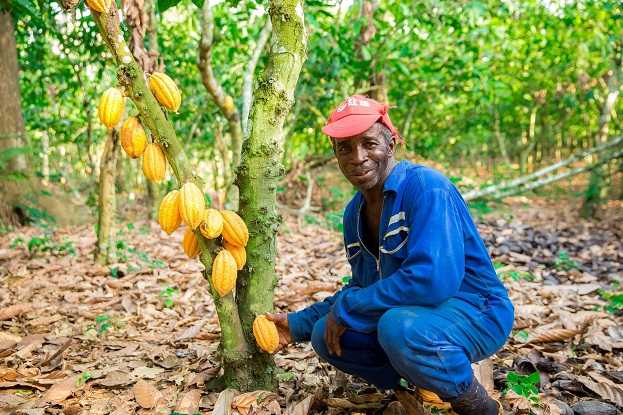KAKUM NATIONAL PARK, Ghana — The Hershey Company (NYSE: HSY) today announced from Kakum National Park in Southern Ghana a package of environmental initiatives and commitments, including establishing a new comprehensive environmental policy, signing the United Nations Global Compact (UNGC) and joining the Science Based Targets initiative.
In addition, Hershey is launching the Kakum Cocoa Agroforestry Landscape Program, focused on improving the well-being of cocoa farmers and their families and strengthening the region’s socio-economic and ecological resilience to climate change.
“Hershey has long demonstrated its belief that business has a responsibility to help protect our communities and the planet we all share,” said Michele Buck, Hershey President and Chief Executive Officer. “Together, these strategic environmental policies and initiatives will further strengthen how Hershey operates, creating a positive social impact from farm to finished product.”
Hershey’s environmental journey began nearly a decade ago when the company set its first carbon reduction targets and soon after began to transition most of its manufacturing facilities to “zero waste to landfill.” Today’s announcement of new initiatives elevates the company’s commitment to environmental stewardship and reflects its belief that commercial enterprises must do their part to protect the planet.
Environmental Policy
Hershey recognizes that climate change is an increasing threat to the health of the planet, and the company’s new comprehensive environmental policy seeks to make meaningful and sustainable change in its impact on the environment. The policy supports the company’s sustainability strategy, called Our Shared Goodness Promise, and creates a framework that will guide future business decisions that have an impact on the environment. It also aligns with the Paris Climate Agreement and supports the UN’s Sustainable Development Goals. Hershey will leverage available data science and engage qualified external stakeholders to inform the company’s environmental strategy.
United Nations Global Compact
Hershey has joined the United Nations Global Compact (UNGC), a voluntary initiative that encourages businesses from around the world to adopt sustainable and socially responsible policies and to report on their implementation. The compact is based on a commitment to implement universal sustainability principles and to take steps to support UN Sustainable Development Goals. Through this partnership, UNGC will help guide Hershey to conduct business more responsibly by aligning strategies and operations with 10 principles focused on the environment, human rights, labor and anti-corruption, while taking substantive actions to advance broader societal goals.
Science-Based Targeting
Hershey also will join the Science Based Targets initiative, a global effort that champions the latest in climate science to set science-based targets as an effective way to help companies transition to a low-carbon economy. The initiative is a collaboration between CDP (formerly Carbon Development Project), the UNGC, World Resources Institute and the World Wildlife Fund. Hershey has begun the two-year process of developing science-based targets that encompass the company’s total environmental footprint.
Kakum Cocoa Agroforestry Landscape Program
The Hershey Company has joined forces with cocoa supplier Ecom, Ghana’s Nature Conservation Research Centre, the Ghana Forestry Commission and the Ghana Cocoa Board to launch an initiative to protect the forest surrounding the Kakum National Park in Southern Ghana and create a more sustainable cocoa agroforestry system. The program is designed to benefit more than 100,000 people in the region and enhance the livelihoods of local cocoa farmers and strengthen the socio-economic and ecological resilience to climate change across this 118,000 sq. hectare landscape.
The program is part of the company’s commitment as a member of the Cocoa Forest Initiative (CFI) and supports Hershey’s half-billion-dollar Cocoa For Good sustainability strategy. The program seeks to drive zero deforestation and create long-term systemic change with increased agroforestry and shade grown cocoa along with landscape governance and community empowerment.
Hershey’s CFI commitment was made last year in partnership with the World Cocoa Foundation and 11 other leading cocoa and chocolate companies with a goal to end deforestation and forest degradation in the global cocoa supply chain. The work will focus initially on Côte d’Ivoire and Ghana. Hershey’s no deforestation work includes three pillars: forest protection and restoration, sustainable production and farmer livelihoods, and community engagement and social inclusion.
“Protecting forests and preserving the natural resources of the cocoa-growing areas here in West Africa is good for society and the bottom line,” added Hershey’s Jeff King, Senior Director of Global Sustainability and Social Impact. “Our commitment to forest protection aligns perfectly with our sourcing partners in the region and we know that by combining resources we will have greater impact on these communities and surrounding landscapes.”
“We are excited by the pioneering commitment that Hershey has shown to the Kakum Program here in Ghana, and to the environment globally,” said Rebecca Ashley Asare, Director of Programmes & Research, Nature Conservation Research Centre in Ghana. “This program will demonstrate that at scale, cocoa agroforestry practices can transform how the crop is farmed in Ghana and beyond. And through the partnership, we can increase resilience and adaptability by reaching all the way to individual farmers with resources that can reduce deforestation and loss of ecosystem services through community-based landscape governance mechanism.”










